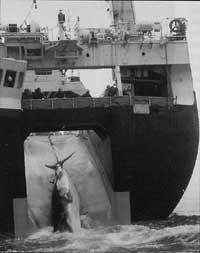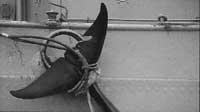From the arpon to the plate

The International Whale Commission (IWC) is concerned about the intention of Norway and Japan to create a database with whale DNA profiles. The Commission held its annual meeting in Oman last May and advocated for the international dissemination of this state database.
CITES, the International Assembly for the Regulation of Trade in Endangered Species, is responsible for exporting countries of whale meat. However, these two States claim the right to annually capture a certain number of whales for domestic or research markets. The fact that the whales captured by Norway are exported and sold in Japan has been denounced on more than one occasion, and the only way to deny is the DNA profile. Using the database, inspectors could check that whale meat sold in a nation is captured by local ships.
The moratorium on commercial whale hunting has been in force since 1986. If, as Norway and Japan hope to stimulate whale fishing, the IWC wants to use the whale's DNA profile to ensure the fishing quotas set. Jim McClay, a member of the IWC Committee of New Zealand, affirms that if a system is implemented organized by quotas, it is necessary that whale products can follow the path of ships to the market.
Norway and Japan will pay the database costs and carry out genetic studies themselves, but are not willing to invest money in the database and leave everything at the disposal of the IWC.
Pro-whaling states want to use genetic data to deny the accusations of the illegal capture and sale of whales. They expect the database to be a step towards the provisional recovery of trade in whale meat.

Other states want these records to be protected by the IWC. If this database is to be a system that controls the fishing of whales caught for commercial purposes, it cannot be transferred to nations in favor of whaling. They would have little credibility if these data depended on national governments.
In March scientists from Norway, Japan, Denmark and the US came together to decide which genetic features will be used to identify whales. Eight fragments of different parts of the whale genome were selected that serve to differentiate individual individuals. The scientists also collected data on the whaling species and the mitochondrial DNA of the whale reporting on the original sea.
Norway and Japan have already begun to analyze the samples. All data will be collected at the Bergane Fishing Directorate and at the Tokyo Cetacean Research Institute. Both entities ensure that, if requested, all IWC members will have access to this data.
Buletina
Bidali zure helbide elektronikoa eta jaso asteroko buletina zure sarrera-ontzian











